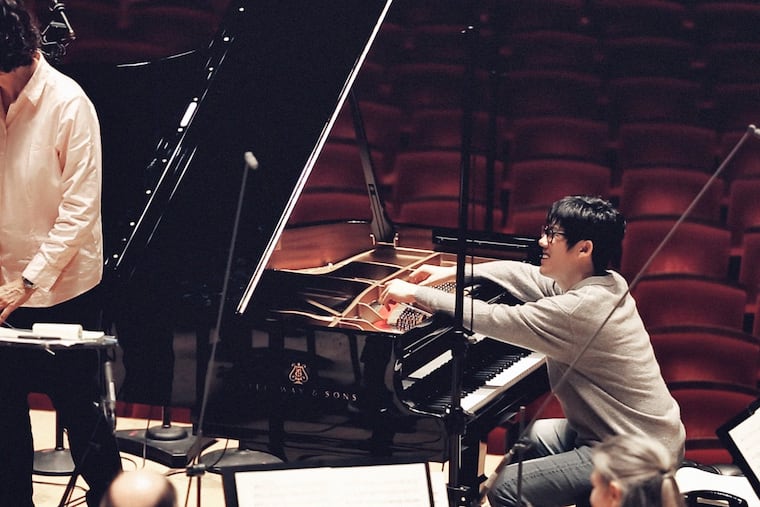For up-and-coming musicians, putting in work means starting at the top
Increasingly, young artists like Haochen Zhang, Yuja Wang, Stewart Goodyear, and James Ehnes take on heavy-weight repertoire they are often advised to save for middle age — or older.

Complete Beethoven piano concerto recordings just don’t just arrive out of thin air. But so it may seem in the just-released set — Nos. 1-5— by pianist Haochen Zhang and the Philadelphia Orchestra under principal guest conductor Nathalie Stutzmann.
All five concertos were recorded over three days at the Kimmel Center after only one two-hour rehearsal session.
Any project this big would be typically preceded by concert performances or recorded live. But having been planned before lockdown the ambitious recording session left the Philadelphia-based Zhang “shocked and uncertain but also excited. I know how scarce the opportunity is to record with the Philadelphia Orchestra, and not one, but all five of the Beethoven concertos.”
While recording, change-of-heart retakes were out. Yet he stood back from it all and concluded, “It’s possible.”
Having won first prize at the super-high-pressure Van Cliburn International Piano Competition in 2009, Zhang, 32, has taken on opportunities such as learning Beethoven’s Piano Concerto No. 5 (“Emperor”) in less than a week to fill in for a colleague.
At times, the Beethoven sessions often evolved into live performances in a studio setting. “There really were moments,” he said, “when I forgot that I was recording and was just playing.”
The finished set (onthe much-awarded Swedish label BIS) is much in line with the current classical marketplace.
Increasingly, young artists take on heavy-weight repertoire that musicians were advised to save for middle age — or older. Yuja Wang, who like Zhang is a Curtis Institute graduate wasn’t yet 30 when she played Beethoven’s fearsome Piano Sonata No. 29 (“Hammerklavier”). The sentiment is that’s King Lear repertoire: If you wait until you’re old enough to understand it, you might not have the stamina to get through it.
Increasingly, artists have started at the summit, or close to it, such as Canadian violinist James Ehnes, whose early-career calling card was his recording the Bach Sonatas and Partitas for Unaccompanied Violin. His justification was that, as an up-and-coming musician, he had the time to study the pieces to a degree that wouldn’t be possible once his career took off (which it did).
Then there’s the increasingly popular immersion mentality — and the epic journey that goes with it for artists or listeners. Pianist Stewart Goodyear was 35 when he played a 2013 Beethoven “Sonatathon” at Princeton’s McCarter Theatre — all 32 sonatas in one day that, when heard in chronological order of their creation, can be like succeeding chapters in a great novel.
The Finnish cellist-turned-conductor Klaus Mäkelä, 26, made his audacious, recording debut this year with a complete set of the seven Sibelius symphonies, recorded with the Oslo Philharmonic mostly in ten days spread over five weeks. It’s one of the more acclaimed classical releases of the year.
The one-fell-swoop approach, however, can reveal blind spots. In Yannick Nézet-Séguin’s recent set of Beethoven symphonies with Chamber Orchestra of Europe (recorded July 2021 in Baden-Baden), the earlier, less-played symphonies feel like two formidable minds that don’t quite meet.
Zhang’s Beethoven benefitted greatly from his encyclopedic memory. From his early childhood lessons in his native Shanghai, he made it a sport of memorizing difficult works in decreasingly fewer days, and discovered that in doing so, he learned the music with greater depth. Zhang approached the Beethoven recording sessions both knowing the pieces and having a cultivated personal concept of the composer, and the 22 years (1787-1809) over which the five concertos were written.
The two early concertos that Zhang knows the least unfold with unaffected spontaneity. He draws in the ear during the broad strokes that open Piano Concerto No. 3.
His demure, soliloquy-like treatment of the famous solo piano entrance that begins the Piano Concerto No. 4 reveals Beethoven the architect. “He was able to pull an entire 40-minute work out of a few bars,” said Zhang. “It’s simple but at the same time grand.”
The grandest — the Piano Concerto No. 5 — fascinates Zhang for its way of challenging the limits of music: “This mysterious, complex, enduring, enigmatic personality was able to expand the musical territory, but somehow, in the end, to pull the extremes into the very center so that nothing breaks.”
Many musicians say the intensity of the recording process takes them to new insights. So, too, with Zhang.
“My love for these pieces only grew,” he said.